Fleurs du Mal Magazine


Or see the index
.jpg)
John Keats
(1795-1821)
Fancy
Ever let the Fancy roam,
Pleasure never is at home:
At a touch sweet Pleasure melteth,
Like to bubbles when rain pelteth;
Then let winged Fancy wander
Through the thought still spread beyond her:
Open wide the mind’s cage-door,
She’ll dart forth, and cloudward soar.
O sweet Fancy! let her loose;
Summer’s joys are spoilt by use,
And the enjoying of the Spring
Fades as does its blossoming;
Autumn’s red-lipp’d fruitage too,
Blushing through the mist and dew,
Cloys with tasting: What do then?
Sit thee by the ingle, when
The sear faggot blazes bright,
Spirit of a winter’s night;
When the soundless earth is muffled,
And the caked snow is shuffled
From the ploughboy’s heavy shoon;
When the Night doth meet the Noon
In a dark conspiracy
To banish Even from her sky.
Sit thee there, and send abroad,
With a mind self-overaw’d,
Fancy, high-commission’d:–send her!
She has vassals to attend her:
She will bring, in spite of frost,
Beauties that the earth hath lost;
She will bring thee, all together,
All delights of summer weather;
All the buds and bells of May,
From dewy sward or thorny spray;
All the heaped Autumn’s wealth,
With a still, mysterious stealth:
She will mix these pleasures up
Like three fit wines in a cup,
And thou shalt quaff it:–thou shalt hear
Distant harvest-carols clear;
Rustle of the reaped corn;
Sweet birds antheming the morn:
And, in the same moment, hark!
‘Tis the early April lark,
Or the rooks, with busy caw,
Foraging for sticks and straw.
Thou shalt, at one glance, behold
The daisy and the marigold;
White-plum’d lillies, and the first
Hedge-grown primrose that hath burst;
Shaded hyacinth, alway
Sapphire queen of the mid-May;
And every leaf, and every flower
Pearled with the self-same shower.
Thou shalt see the field-mouse peep
Meagre from its celled sleep;
And the snake all winter-thin
Cast on sunny bank its skin;
Freckled nest-eggs thou shalt see
Hatching in the hawthorn-tree,
When the hen-bird’s wing doth rest
Quiet on her mossy nest;
Then the hurry and alarm
When the bee-hive casts its swarm;
Acorns ripe down-pattering,
While the autumn breezes sing.
Oh, sweet Fancy! let her loose;
Every thing is spoilt by use:
Where’s the cheek that doth not fade,
Too much gaz’d at? Where’s the maid
Whose lip mature is ever new?
Where’s the eye, however blue,
Doth not weary? Where’s the face
One would meet in every place?
Where’s the voice, however soft,
One would hear so very oft?
At a touch sweet Pleasure melteth
Like to bubbles when rain pelteth.
Let, then, winged Fancy find
Thee a mistress to thy mind:
Dulcet-ey’d as Ceres’ daughter,
Ere the God of Torment taught her
How to frown and how to chide;
With a waist and with a side
White as Hebe’s, when her zone
Slipt its golden clasp, and down
Fell her kirtle to her feet,
While she held the goblet sweet
And Jove grew languid.–Break the mesh
Of the Fancy’s silken leash;
Quickly break her prison-string
And such joys as these she’ll bring.–
Let the winged Fancy roam,
Pleasure never is at home.
John Keats poetry
fleursdumal.nl magazine
More in: Archive K-L, John Keats, Keats, John

Amy Levy
(1861-1889)
Ballade of a Special Edition
He comes; I hear him up the street–
Bird of ill omen, flapping wide
The pinion of a printed sheet,
His hoarse note scares the eventide.
Of slaughter, theft, and suicide
He is the herald and the friend;
Now he vociferates with pride–
A double murder in Mile End!
A hanging to his soul is sweet;
His gloating fancy’s fain to bide
Where human-freighted vessels meet,
And misdirected trains collide.
With Shocking Accidents supplied,
He tramps the town from end to end.
How often have we heard it cried–
A double murder in Mile End.
War loves he; victory or defeat,
So there be loss on either side.
His tale of horrors incomplete,
Imagination’s aid is tried.
Since no distinguished man has died,
And since the Fates, relenting, send
No great catastrophe, he’s spied
This double murder in Mile End.
Fiend, get thee gone! no more repeat
Those sounds which do mine ears offend.
It is apocryphal, you cheat,
Your double murder in Mile End.
Amy Levy poetry
fleursdumal.nl magazine
More in: Amy Levy, Archive K-L, Levy, Amy
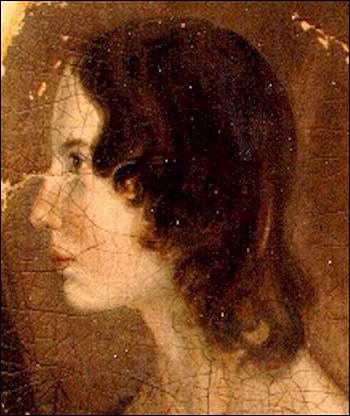
Emily Jane Brontë
(1818-1848)
Remembrance
Cold in the earth–and the deep snow piled above thee,
Far, far, removed, cold in the dreary grave!
Have I forgot, my only Love, to love thee,
Severed at last by Time’s all-severing wave?
Now, when alone, do my thoughts no longer hover
Over the mountains, on that northern shore,
Resting their wings where heath and fern-leaves cover
Thy noble heart for ever, ever more?
Cold in the earth–and fifteen wild Decembers,
From those brown hills, have melted into spring:
Faithful, indeed, is the spirit that remembers
After such years of change and suffering!
Sweet Love of youth, forgive, if I forget thee,
While the world’s tide is bearing me along;
Other desires and other hopes beset me,
Hopes which obscure, but cannot do thee wrong!
No later light has lightened up my heaven,
No second morn has ever shone for me;
All my life’s bliss from thy dear life was given,
All my life’s bliss is in the grave with thee.
But, when the days of golden dreams had perished,
And even Despair was powerless to destroy;
Then did I learn how existence could be cherished,
Strengthened, and fed without the aid of joy.
Then did I check the tears of useless passion–
Weaned my young soul from yearning after thine;
Sternly denied its burning wish to hasten
Down to that tomb already more than mine.
And, even yet, I dare not let it languish,
Dare not indulge in memory’s rapturous pain;
Once drinking deep of that divinest anguish,
How could I seek the empty world again?
.jpg)
Ellis Bell (Emily Jane Brontë) poetry
fleursdumal.nl magazine
More in: - Archive Tombeau de la jeunesse, Anne, Emily & Charlotte Brontë, Archive A-B, Brontë, Anne, Emily & Charlotte
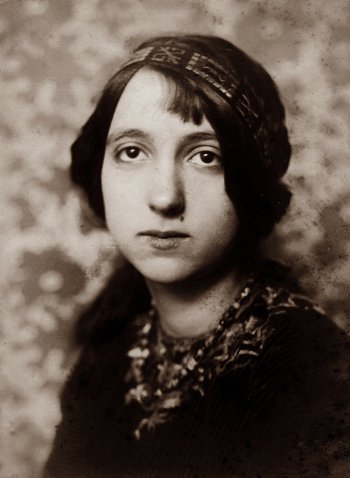
Mireille Havet
(1898-1932)
Connaissance
À la comtesse Jean de Limur
La vie souple, comme une cravache
en plein visage m’a flagellée.
Je m’en vais douce, inoffensive
dans le crépuscule printanier
qui emplit les rues de jeux de billes,
de marelles étoilées.
La lampe
allumée sur le potage,
les faïences,
tel qu’on aurait pu être,
Mais la vie trop souple
de sa fine lanière cingle
les enfants tristes,
et l’âme se plie féline,
domptée
vers la mort qui est sa récompense.
Les enfants du cordonnier
jouent dans la cour
avec des cris qui montent
rappelant des hangars, des faubourgs ;
un arbre bouge tout pointé
de bourgeons verts
et mes larmes sourdes et tenaces
sont prises en moi,
source merveilleuse qui chemine
et s’en va
sous la terre
s’épuiser au long des larmes stériles
de l’amour,
sous la lune grise
qui annonce la belle saison,
les mains enlacées
les lents et balancés
retours à la maison
— la nuit —
au matin l’aubépinier entier s’était fleuri,
et contre moi
comme une bête,
comme un ange terrassé
j’étrangle ma joie d’hier
neuve, insolente
et dont j’aimerais mourir
Ô solitude
magnifique et suprême
que ton dur visage
se mesure bien à mon regard,
face à face comme toujours,
mon âme nue se déploie
au silence des larmes.
Toute ma jeunesse me tire cependant
m’entraîne,
dans l’incroyable
foule humaine
et je reprends la chaîne qui nous lie
à la terre.
Il n’y a rien d’autre,
le pain quotidien
le travail
la jouissance étonnante
du chagrin
qui ressemble à la mer.
Nous mourons d’espoirs,
de nuances douces couleur de lilas
et plus fragiles encore au contact
des doigts
que le bleu effronté des papillons des îles.
Le coup direct ne tue pas si bien
que l’aiguillon secret
qui taquine en silence,
hameçon subtil
glissé dans l’eau
entre les tiges de lotus blancs.
Promenades en bateau,
première étoile
naissante
et qui éclate comme une fleur
à l’horizon des anges,
Vénus au nom de malheur.
J’ai tout vu
le balancement des rames
au fil du courant,
la main douce dans la petite vague
le charme des femmes
leur tendresse navrante
caprice sentimental d’un instant
ont perdu mon âme
qui cherchait leur douceur.
Hamlet, Ophélie, les deux pigeons.
Je poursuis le dérisoire visage de l’amour
au seuil condamnable
au seuil écolier
de mes vingt ans.
Très menteuse et très chère
je vous dédie et je vous signe
ce poème,
vous y retrouverez
tout ce que vous détestez en moi
et même le peu que vous aimiez.
Le jeu est fini
la comédie terminée,
je m’en retourne
front lourd et jambes rompues
vers mon enfance
à la poursuite de la lumière
que vous m’avez empoisonnée.
Ô menteuse
la plus cruelle,
souriez à l’éternelle méchanceté humaine
qui me fit en neuf jours
votre petit arlequin bariolé
et ce soir le pierrot balafré
qui vous quitte
visage blanc camouflé de gifles
dans l’incohérence crépusculaire
et douce
du printemps.
La Revue européenne n°3 (1er mai 1923)
Mireille Havet poetry
fleursdumal.nl magazine
More in: Archive G-H, Havet, Mireille, Mireille Havet
.jpg)
Novalis
(Friedrich von Hardenberg, 1772–1802)
Hymnen an die Nacht 6
Sehnsucht nach dem Tode
Hinunter in der Erde Schooß,
Weg aus des Lichtes Reichen,
Der Schmerzen Wuth und wilder Stoß
Ist froher Abfahrt Zeichen.
Wir kommen in dem engen Kahn
Geschwind am Himmelsufer an.
Gelobt sey uns die ewge Nacht,
Gelobt der ewge Schlummer.
Wohl hat der Tag uns warm gemacht,
Und welk der lange Kummer.
Die Lust der Fremde ging uns aus,
Zum Vater wollen wir nach Haus.
Was sollen wir auf dieser Welt
Mit unsrer Lieb’ und Treue.
Das Alte wird hintangestellt,
Was soll uns dann das Neue.
O! einsam steht und tiefbetrübt,
Wer heiß und fromm die Vorzeit liebt.
Die Vorzeit wo die Sinne licht
In hohen Flammen brannten,
Des Vaters Hand und Angesicht
Die Menschen noch erkannten.
Und hohen Sinns, einfältiglich
Noch mancher seinem Urbild glich.
Die Vorzeit, wo noch blüthenreich
Uralte Stämme prangten,
Und Kinder für das Himmelreich
nach Quaal und Tod verlangten.
Und wenn auch Lust und Leben sprach,
Doch manches Herz für Liebe brach.
Die Vorzeit, wo in Jugendglut
Gott selbst sich kundgegeben
Und frühem Tod in Liebesmuth
Geweiht sein süßes Leben.
Und Angst und Schmerz nicht von sich trieb,
Damit er uns nur theuer blieb.
Mit banger Sehnsucht sehn wir sie
In dunkle Nacht gehüllet,
In dieser Zeitlichkeit wird nie
Der heiße Durst gestillet.
Wir müssen nach der Heymath gehn,
Um diese heilge Zeit zu sehn.
Was hält noch unsre Rückkehr auf,
Die Liebsten ruhn schon lange.
Ihr Grab schließt unsern Lebenslauf,
Nun wird uns weh und bange.
Zu suchen haben wir nichts mehr –
Das Herz ist satt – die Welt ist leer.
Unendlich und geheimni?voll
Durchströmt uns süßer Schauer –
Mir däucht, aus tiefen Fernen scholl
Ein Echo unsrer Trauer.
Die Lieben sehnen sich wohl auch
Und sandten uns der Sehnsucht Hauch.
Hinunter zu der süßen Braut,
Zu Jesus, dem Geliebten –
Getrost, die Abenddämmrung graut
Den Liebenden, Betrübten.
Ein Traum bricht unsre Banden los
Und senkt uns in des Vaters Schooß.
.jpg)
Novalis poetry
fleursdumal.nl magazine
More in: Archive M-N, Novalis, Novalis
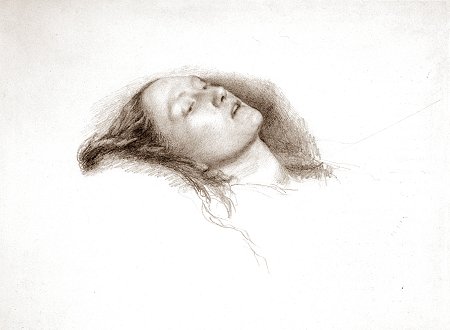
Elizabeth (Lizzie) Siddal
(1829-1862)
A Year and a Day
Slow days have passed that make a year,
Slow hours that make a day,
Since I could take my first dear love
And kiss him the old way;
Yet the green leaves touch me on the cheek,
Dear Christ, this month of May.
I lie among the tall green grass
That bends above my head
And covers up my wasted face
And folds me in its bed
Tenderly and lovingly
Like grass above the dead.
Dim phantoms of an unknown ill
Float through my tired brain;
The unformed visions of my life
Pass by in ghostly train;
Some pause to touch me on the cheek,
Some scatter tears like rain.
A shadow falls along the grass
And lingers at my feet;
A new face lies between my hands –
Dear Christ, if I could weep
Tears to shut out the summer leaves
When this new face I greet.
Still it is but the memory
Of something I have seen
In the dreamy summer weather
When the green leaves came between:
The shadow of my dear love’s face –
So far and strange it seems.
The river ever running down
Between its grassy bed,
The voices of a thousand birds
That clang above my head,
Shall bring to me a sadder dream
When this sad dream is dead.
A silence falls upon my heart
And hushes all its pain.
I stretch my hands in the long grass
And fall to sleep again,
There to lie empty of all love
Like beaten corn of grain.
Elizabeth (Lizzie) Siddal poems
fleursdumal.nl magazine
More in: Archive S-T, Lizzy Siddal, Siddal, Lizzy

John Keats
(1795 – 1821)
When I Have Fears
When I have fears that I may cease to be
Before my pen has gleaned my teeming brain,
Before high-piled books, in charactery,
Hold like rich garners the full ripened grain;
When I behold, upon the night’s starred face,
Huge cloudy symbols of a high romance,
And think that I may never live to trace
Their shadows, with the magic hand of chance;
And when I feel, fair creature of an hour,
That I shall never look upon thee more,
Never have relish in the fairy power
Of unreflecting love; – then on the shore
Of the wide world I stand alone, and think
Till love and fame to nothingness do sink.
John Keats poetry
fleursdumal.nl magazine
More in: Archive K-L, John Keats, Keats, John
Elizabeth (Lizzie) Siddall
(1829-1862)
Worn Out
Thy strong arms are around me, love
My head is on thy breast;
Low words of comfort come from thee
Yet my soul has no rest.
For I am but a startled thing
Nor can I ever be
Aught save a bird whose broken wing
Must fly away from thee.
I cannot give to thee the love
I gave so long ago,
The love that turned and struck me down
Amid the blinding snow.
I can but give a failing heart
And weary eyes of pain,
A faded mouth that cannot smile
And may not laugh again.
Yet keep thine arms around me, love,
Until I fall to sleep;
Then leave me, saying no goodbye
Lest I might wake, and weep.
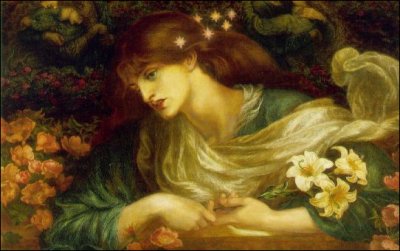
fleursdumal.nl magazine
More in: Archive S-T, Lizzy Siddal, Siddal, Lizzy
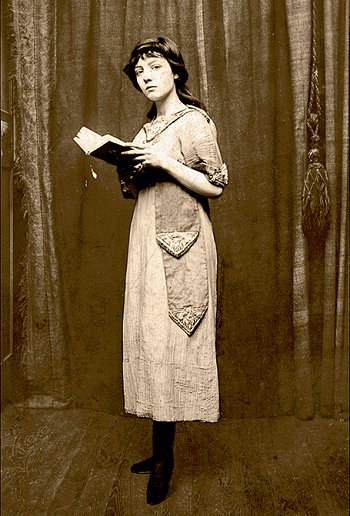
Mireille Havet
(1898-1932)
Le voyage
Hier, j’ai rencontré le voyage.
Il m’a dit bonjour. Il m’a dit : viens-tu ?
Son beau train flambant soufflait, sur les rails comme le cheval qui piaffe entre les rênes sûres.
Il m’a dit : regarde, le ciel lavé d’après les grêles d’avril est ouvert à la sortie du hall et voici déjà la campagne offrant les deux paumes de ses plaines, les longues sentes effilées de ses doigts accrochés aux forêts mitoyennes et ses ongles purs où sourit une étoile, qui sont les lacs, les fontaines, les abreuvoirs au seuil des fermes et la source jaillissante qui s’égrène entre la haie de crocus.
Va ! Prends la portière, ne consulte point d’indicateur, Toutes les heures sont belles et toutes les lignes sont bonnes… Si tu es un conquérant, il n’y a que le voyage !
Et je suis restée immobile et timide.
Le beau train dans la gare a sifflé… Son dernier wagon sur la voie qui tourne s’en est allé, tremblant comme un grelot noir.
Au retour, la ville me parut plus meurtrière encore. Je toussais le long de ses quais interminables. Enfant Prodigue qui avait refusé l’espace comme on renvoie un chien errant.
J’ai repris la routine des jours, l’oisiveté qui dévore plus que l’amour… Le grand licol de la ville baille autour de mon cou et cependant je n’ai pas su m’enfuir, craignant peut-être la solitude et la rencontre de mon âme que je veux croire perdue ?
Mais, au tournant de la rue, entre deux voitures qui se heurtaient, je l’ai rencontrée, mon âme. Elle sautait devant moi comme une petite fille folle et ses deux mains tremblantes se secouaient dans l’air. Elle avait cependant un tablier rosé… On aurait dit une meurtrière de huit ans. Comme j’allais l’atteindre, un camion m’en à séparée,… dès qu’il fut passé, je bondis, mais hélas je ne trouvai plus, planté dans l’herbe courte des Champs-Elysées, qu’un petit coquelicot maigre et ardent qui battait de la crête comme un petit coq malade.
Alors, je suis passée, prononçant des mots de tristesse vagues et mouvants comme des algues et qui se perdirent dans la rumeur de la ville, s’unissant au cri perpétuel de Paris qui nous enfarine, afin d’en poudrer son ciel clair, nos rêves les plus beaux, nos chairs les plus fines et nos désirs avortés d’univers.
Paris 1918
Revue Les Écrits Nouveaux Tome III – N°20 (Aout 1919)
Mireille Havet poetry
fleursdumal.nl magazine
More in: Archive G-H, Havet, Mireille, Mireille Havet
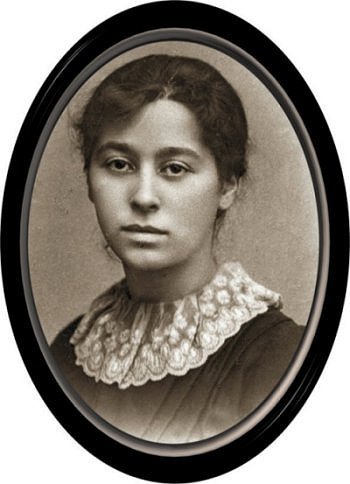
Amy Levy
(1861-1889)
Borderland
Am I waking, am I sleeping?
As the first faint dawn comes creeping
Thro’ the pane, I am aware
Of an unseen presence hovering,
Round, above, in the dusky air:
A downy bird, with an odorous wing,
That fans my forehead, and sheds perfume,
As sweet as love, as soft as death,
Drowsy-slow through the summer-gloom.
My heart in some dream-rapture saith,
It is she. Half in a swoon,
I spread my arms in slow delight.–
O prolong, prolong the night,
For the nights are short in June!
Amy Levy poetry
fleursdumal.nl magazine
More in: Amy Levy, Archive K-L, Levy, Amy
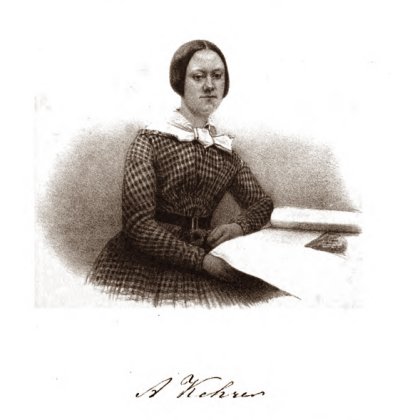
Albertine Kehrer
(1826-1852)
Zielzucht
Ver in ‘t verschiet ligt het doel van mijn zwerven,
Strijd en vermoeijing verwacht me op de baan;
Groot is mijn dagtaak nog, eer ik mag sterven,
En voor mij de ure der ruste zal slaan.
Ligt heeft Gods trouw mij nog droefheid en lijden –
Bittre geneesdrank der zielen – bereid;
Veel heb ik nog in zijn kracht te bestrijden,
Eer mij de vreugd des verwinnaars verbeidt.
Wel riep zijn Geest reeds een vonk in mij wakker
– Aanvang van ‘t hoogere leven der ziel -,
Ach maar hoe vaak nog verdringt in mijn akker
‘t Onkruid der zonde het zaad dat er viel!
‘k Voel nog zoo dikwerf de liefde me ontbreken,
d’IJver verkouden, ‘t geloove zoo klein!
‘k Zie dan de star van mijn vrede verbleeken,
‘k Weet mij zoo arm, zoo misvormd, zoo onrein!
Soms heft mijn ziel, op de wiek der gebeden,
Vurig en vrij zich omhoog tot haar God;
Bidt en ontvangt, voor zijn aanschijn getreden,
Kracht ter volbrenging van ‘t zwaarste gebod.
Ach, maar te ras trekt, met dubbele koorden,
‘t Werktuig van stof haar naar d’aard weer ter neer;
Nog wil zij bidden, maar ‘t faalt haar aan woorden,
Zuchten slechts heeft ze… Och! versta die, o Heer!
Ken en verhoor de ongesprokene bede
Let op de ziel die uw hulpe verwacht!
Och! deel de stroomen uws geestes mij mede!
Och! worde uw kracht in mijn zwakheid volbragt!
Leer me, onvermoeibaar, naar ‘t hoogste te streven,
Heilig te zijn als uw heilige Zoon!
Dat ik voor U in mijn hart en mijn leven
‘t Beeld van een burger des Hemels vertoon!
Zij dan het uur mijner rust nog verschoven,
Wacht mij nog arbeid en moeite op de baan:
‘k Hoop, onder wakend en biddend gelooven,
Vrolijk mijn reisweg ten einde te gaan!
Albertine Kehrer poetry
fleursdumal.nl magazine
More in: Albertine Kehrer, Archive K-L, Kehrer, Albertine
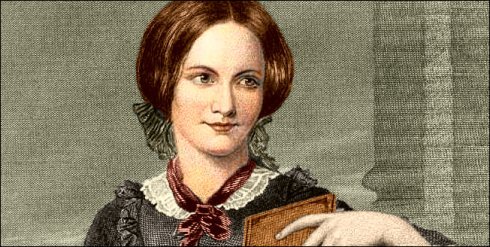
Charlotte Brontë
(1816–1855)
The Wood
But two miles more, and then we rest!
Well, there is still an hour of day,
And long the brightness of the West
Will light us on our devious way;
Sit then, awhile, here in this wood–
So total is the solitude,
We safely may delay.
These massive roots afford a seat,
Which seems for weary travellers made.
There rest. The air is soft and sweet
In this sequestered forest glade,
And there are scents of flowers around,
The evening dew draws from the ground;
How soothingly they spread!
Yes; I was tired, but not at heart;
No–that beats full of sweet content,
For now I have my natural part
Of action with adventure blent;
Cast forth on the wide world with thee,
And all my once waste energy
To weighty purpose bent.
Yet–sayst thou, spies around us roam,
Our aims are termed conspiracy?
Haply, no more our English home
An anchorage for us may be?
That there is risk our mutual blood
May redden in some lonely wood
The knife of treachery?
Sayst thou, that where we lodge each night,
In each lone farm, or lonelier hall
Of Norman Peer–ere morning light
Suspicion must as duly fall,
As day returns–such vigilance
Presides and watches over France,
Such rigour governs all?
I fear not, William; dost thou fear?
So that the knife does not divide,
It may be ever hovering near:
I could not tremble at thy side,
And strenuous love–like mine for thee–
Is buckler strong ‘gainst treachery,
And turns its stab aside.
I am resolved that thou shalt learn
To trust my strength as I trust thine;
I am resolved our souls shall burn
With equal, steady, mingling shine;
Part of the field is conquered now,
Our lives in the same channel flow,
Along the self-same line;
And while no groaning storm is heard,
Thou seem’st content it should be so,
But soon as comes a warning word
Of danger–straight thine anxious brow
Bends over me a mournful shade,
As doubting if my powers are made
To ford the floods of woe.
Know, then it is my spirit swells,
And drinks, with eager joy, the air
Of freedom–where at last it dwells,
Chartered, a common task to share
With thee, and then it stirs alert,
And pants to learn what menaced hurt
Demands for thee its care.
Remember, I have crossed the deep,
And stood with thee on deck, to gaze
On waves that rose in threatening heap,
While stagnant lay a heavy haze,
Dimly confusing sea with sky,
And baffling, even, the pilot’s eye,
Intent to thread the maze–
Of rocks, on Bretagne’s dangerous coast,
And find a way to steer our band
To the one point obscure, which lost,
Flung us, as victims, on the strand;–
All, elsewhere, gleamed the Gallic sword,
And not a wherry could be moored
Along the guarded land.
I feared not then–I fear not now;
The interest of each stirring scene
Wakes a new sense, a welcome glow,
In every nerve and bounding vein ;
Alike on turbid Channel sea,
Or in still wood of Normandy,
I feel as born again.
The rain descended that wild morn
When, anchoring in the cove at last,
Our band, all weary and forlorn
Ashore, like wave-worn sailors, cast–
Sought for a sheltering roof in vain,
And scarce could scanty food obtain
To break their morning fast.
Thou didst thy crust with me divide,
Thou didst thy cloak around me fold;
And, sitting silent by thy side,
I ate the bread in peace untold:
Given kindly from thy hand, ’twas sweet
As costly fare or princely treat
On royal plate of gold.
Sharp blew the sleet upon my face,
And, rising wild, the gusty wind
Drove on those thundering waves apace,
Our crew so late had left behind;
But, spite of frozen shower and storm,
So close to thee, my heart beat warm,
And tranquil slept my mind.
So now–nor foot-sore nor opprest
With walking all this August day,
I taste a heaven in this brief rest,
This gipsy-halt beside the way.
England’s wild flowers are fair to view,
Like balm is England’s summer dew
Like gold her sunset ray.
But the white violets, growing here,
Are sweeter than I yet have seen,
And ne’er did dew so pure and clear
Distil on forest mosses green,
As now, called forth by summer heat,
Perfumes our cool and fresh retreat–
These fragrant limes between.
That sunset! Look beneath the boughs,
Over the copse–beyond the hills;
How soft, yet deep and warm it glows,
And heaven with rich suffusion fills;
With hues where still the opal’s tint,
Its gleam of prisoned fire is blent,
Where flame through azure thrills!
Depart we now–for fast will fade
That solemn splendour of decline,
And deep must be the after-shade
As stars alone to-night will shine;
No moon is destined–pale–to gaze
On such a day’s vast Phoenix blaze,
A day in fires decayed!
There–hand-in-hand we tread again
The mazes of this varying wood,
And soon, amid a cultured plain,
Girt in with fertile solitude,
We shall our resting-place descry,
Marked by one roof-tree, towering high
Above a farmstead rude.
Refreshed, erelong, with rustic fare,
We’ll seek a couch of dreamless ease;
Courage will guard thy heart from fear,
And Love give mine divinest peace:
To-morrow brings more dangerous toil,
And through its conflict and turmoil
We’ll pass, as God shall please.
.jpg)
Currer Bell (Charlotte Brontë) poetry
fleursdumal.nl magazine
More in: Anne, Emily & Charlotte Brontë, Brontë, Anne, Emily & Charlotte
Thank you for reading Fleurs du Mal - magazine for art & literature